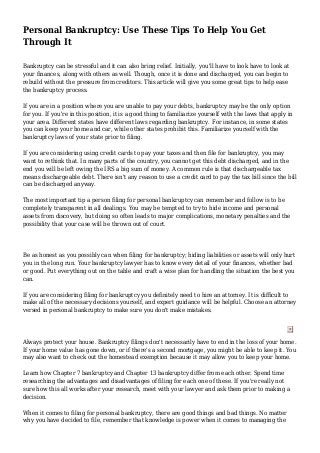
Personal Bankruptcy: Use These Tips To Help You Get Through It
- 1. Personal Bankruptcy: Use These Tips To Help You Get Through It Bankruptcy can be stressful and it can also bring relief. Initially, you'll have to look have to look at your finances, along with others as well. Though, once it is done and discharged, you can begin to rebuild without the pressure from creditors. This article will give you some great tips to help ease the bankruptcy process. If you are in a position where you are unable to pay your debts, bankruptcy may be the only option for you. If you're in this position, it is a good thing to familiarize yourself with the laws that apply in your area. Different states have different laws regarding bankruptcy. For instance, in some states you can keep your home and car, while other states prohibit this. Familiarize yourself with the bankruptcy laws of your state prior to filing. If you are considering using credit cards to pay your taxes and then file for bankruptcy, you may want to rethink that. In many parts of the country, you cannot get this debt discharged, and in the end you will be left owing the IRS a big sum of money. A common rule is that dischargeable tax means dischargeable debt. There isn't any reason to use a credit card to pay the tax bill since the bill can be discharged anyway. The most important tip a person filing for personal bankruptcy can remember and follow is to be completely transparent in all dealings. You may be tempted to try to hide income and personal assets from discovery, but doing so often leads to major complications, monetary penalties and the possibility that your case will be thrown out of court. Be as honest as you possibly can when filing for bankruptcy; hiding liabilities or assets will only hurt you in the long run. Your bankruptcy lawyer has to know every detail of your finances, whether bad or good. Put everything out on the table and craft a wise plan for handling the situation the best you can. If you are considering filing for bankruptcy you definitely need to hire an attorney. It is difficult to make all of the necessary decisions yourself, and expert guidance will be helpful. Choose an attorney versed in personal bankruptcy to make sure you don't make mistakes. Always protect your house. Bankruptcy filings don't necessarily have to end in the loss of your home. If your home value has gone down, or if there's a second mortgage, you might be able to keep it. You may also want to check out the homestead exemption because it may allow you to keep your home. Learn how Chapter 7 bankruptcy and Chapter 13 bankruptcy differ from each other. Spend time researching the advantages and disadvantages of filing for each one of these. If you're really not sure how this all works after your research, meet with your lawyer and ask them prior to making a decision. When it comes to filing for personal bankruptcy, there are good things and bad things. No matter why you have decided to file, remember that knowledge is power when it comes to managing the
- 2. situation. The information you just read will greatly simplify the bankruptcy filing process. Put them to use and see how smooth the process can be and how much happier you will feel!